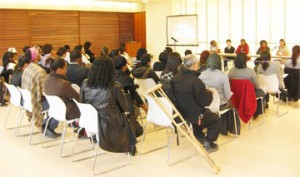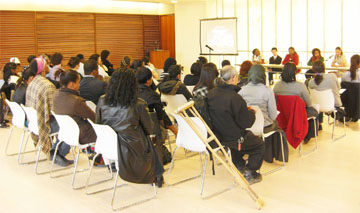In the Diaspora
(This is one of a series of fortnightly columns from Guy-anese in the diaspora and others with an interest in issues related to Guyana and the Caribbean)
Alissa Trotz is the Toronto-based editor of the In the Diaspora Column

Over the last two weeks, two important and different events took place that centred the Caribbean. The first was organized by Shalini Puri at the University of Pittsburgh, and brought together educators (teachers, university lecturers, activists) to commemorate the 50th anniversary of the Cuban revolution and the 30th anniversary of the Grenadian and Nicaraguan revolutions. Rupert Roopnaraine’s keynote address on resonances of revolution moved seamlessly across Guyana, Grenada and Suriname, reminding us of an earlier period when regional solidarity really meant something. His meditation on the collapse of the Grenadian revolution in 1983 and its devastating consequences for the Caribbean anticipated Grenadian poet Merle Collin’s injunction to break difficult silences, and set the tone for the two days of honest and self-critical discussions that followed. Topics included; reflections on the 50th anniversary of the Cuban revolution; the historical contribution of the trade union movement to anti-colonial struggles in the region; the contemporary crisis facing Haiti; the grassroots women who with Red Thread organized a speakout to respond to the Guyana floods of January 2005; the efforts to oppose the signing of the CARIFORUM-European Union Economic Partnership Agreement. A presentation on Venezuelan motorcycle groups (motorizados) by Luis Duno-Gottberg offered us an exciting perspective from Guyana’s western neighbour. Motorizados, numbering in the thousands, are members of a diverse working-class, predominantly non-unionised group who offer delivery and transportation services across Venezuela’s larger cities. They became politically mobilized from around the late 1980s, taking centre stage during the popular revolt called El Caracazo that took place in 1989, and in April 2002 played a vital role in the popular mobilization that reversed a coup d’état against Hugo Chavez. Today some motorizados see themselves as working with and partly for the Bolivarian state; others say that they are part of the revolution and committed to radical social change, but insist on the need for independence from the Venezuelan state if one is not to be co-opted or used by it. Dismissed by conservatives as unruly and violent mobs (stereotypes that are not without racist undertones, given the large proportion of Afro-Venezuelans among them), the motorizados have emerged as a complex and new political force to be reckoned with.
There was an inspiring contribution from anthropologist Yarimar Bonilla, who shared her ongoing work in Guadeloupe, where on January 20 a mass general strike against the prohibitive cost of living effectively shut down the French overseas territory for 44 days. The strike – in which as many as 100,000 people took to the streets to demonstrate – was organised by a broad grouping of 48 organizations that included trade unions, environmentalists, politicians, peasant organizations, musicians and cultural workers, housing advocates, disability rights, and other activists, all coming together under the banner Lyannaj Kont Pwofitasyon (Alliance Against Profiteering). On March 4th, activists finally reached an agreement with the French government that covered some 165 points ranging from minimum wages to reductions on prices of several goods and services.
The Pittsburgh meeting offered bridges between past and present, highlighting continuities in patterns of domination and new challenges facing the region, while also tracking forms of resistance that borrowed from older movements while inventing new languages and practices. One of the things we realized was how little we know of what is going on beyond our immediate environment, of each other’s struggles, especially across linguistic divides. Nowhere was this clearer than in the presentations from the French Caribbean and Latin America, two sites where significant shifts are occurring, but which are covered rarely, if at all, by the Anglophone Caribbean media.
Then, two days ago, Caribbean Studies held its first undergraduate student run conference at the University of Toronto. The idea of Caribbean historian Melanie Newton, the conference was organized by three young women, Lenore Butcher, Latania Christie and Sharifa Khan. On a bright but cold Saturday morning, wedged between Good Friday and Easter Sunday, over 100 people – including parents and other family members – showed up for the all day affair. Several audience members asked if these were post-graduate students, so polished and well-prepared were the presentations. Topics covered included: a discussion of the Jamaican Maroons’ decision to sign a treaty with the British in the 18th century that obligated them to help capture and return runaway slaves; the popularity of skin bleaching products in the Caribbean; the human condition as represented in the art of Guyanese painters E. R. Burrowes and Bernadette Persaud; the poetry of St. Lucian Nobel Laureate Derek Walcott; Indian identity in Jamaica; and Jose Marti and the Cuban Revolution. Presenters were from three universities in Toronto (the University of Toronto, Ryerson and York). All had different relationships to the Caribbean, from a young man who had been introduced to Caribbean literature in a course on migration, to a young woman with an interest in Indo-Caribbean writers whose family has returned to Guyana only once since they left some thirty years ago, to a recent migrant whose reflections on Caribbean homophobia included a discussion of the outrageous charges recently brought against a group of men for cross-dressing in Guyana. The final panel and a spoken word segment by Motion, an award winning local artist, engaged the Caribbean beyond the classroom. One entrepreneur explained how she created an opportunity for herself bridging Canada and the island of St. Maarten through tourism. Christine Randle from Ian Randle Publishers in Jamaica made everyone think about the significance of a regional publishing house dedicated to Caribbean knowledge creation. A young woman whose father was a member of the bauxite union that played such an important role in Guyana’s anti-dictatorial struggles, talked about her work with youth combating racism and stereotypes in Toronto. And Kabir Joshi-Vijayan, whose parents hail from India, taught everyone what international solidarity looks like. Politically active since he was 11 years old, he is a high school student and one of the leading lights in the Toronto Haiti Action Committee that challenges Canadian foreign policy in relation to Haiti (the solidarity group formed following the Canadian government’s active involvement in the forceful removal of democratically elected President Jean-Bertrand Aristide).
Kabir also hosts a radio programme in Toronto that addresses issues facing working-class communities, and is an active member of a coalition that challenges how young people of colour are disproportionately targeted as trouble-makers and harassed in Toronto schools. The conference brought out youth and elders; gave students from across three universities the opportunity to meet and share with each other for the first time; demonstrated the ongoing and exciting interest in the Caribbean; and underlined that the diaspora has a potentially important role to play in the region. If the Pittsburgh meetings urged us to remember the future and looked for hope in the contemporary Caribbean and Latin America, the event that unfolded in Toronto this past weekend reminded us that the Caribbean exists out here as well, and reassured us that there is a new generation that can take up this challenge in different and sometimes unanticipated ways.

